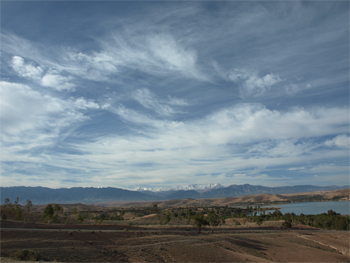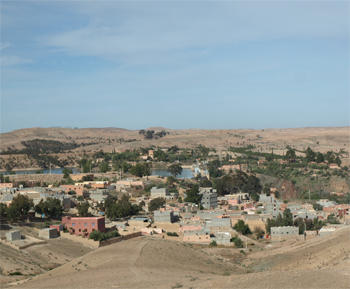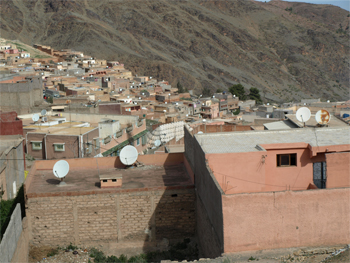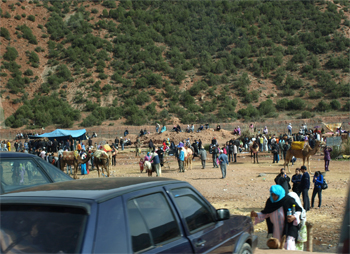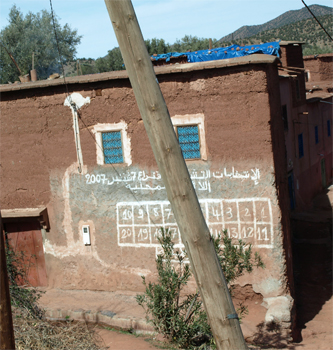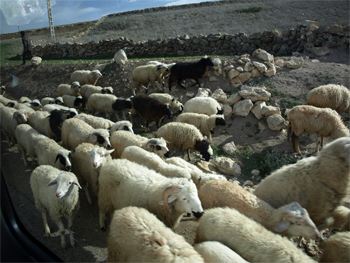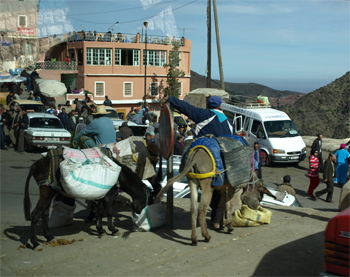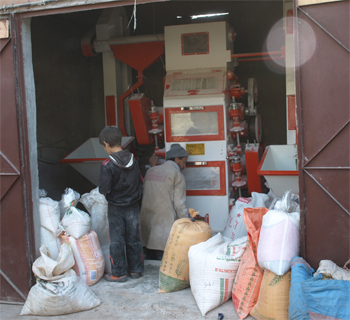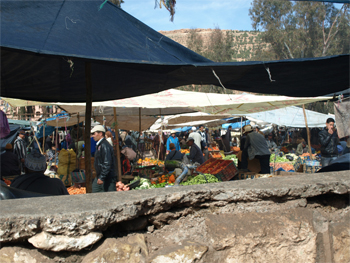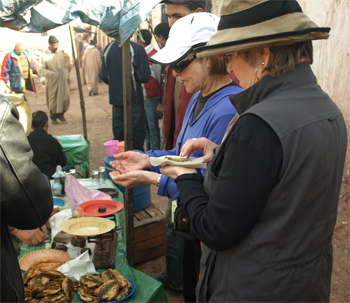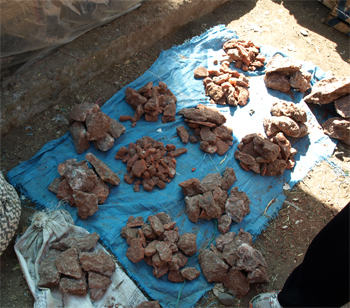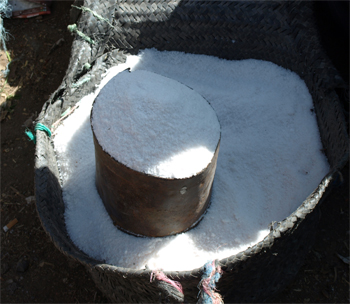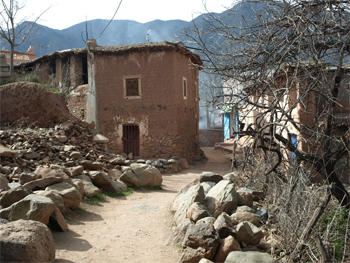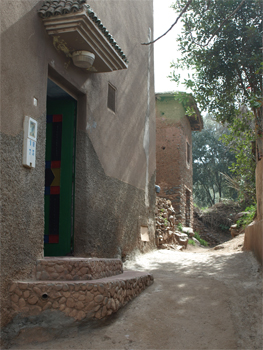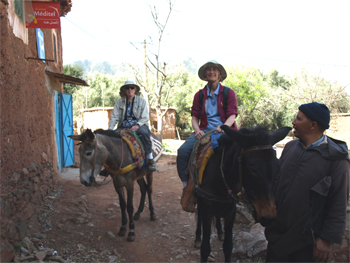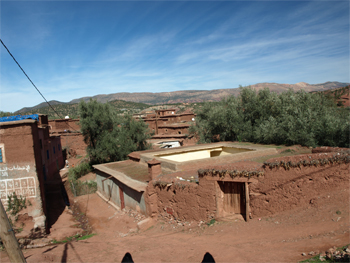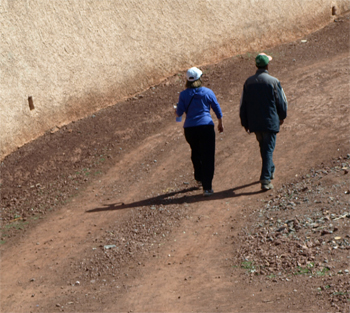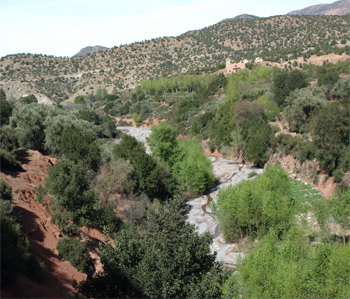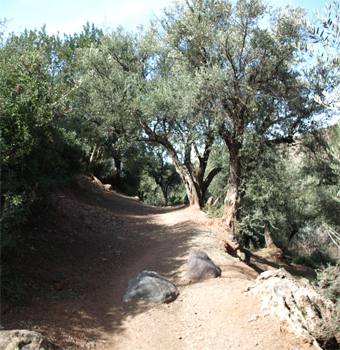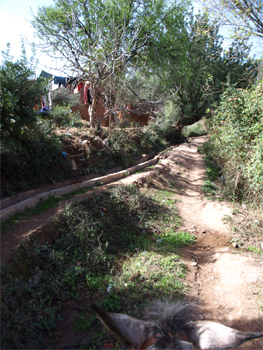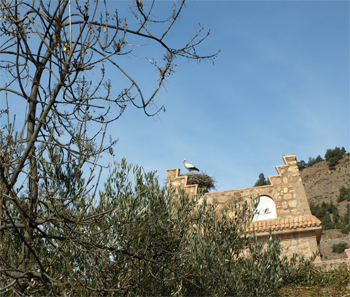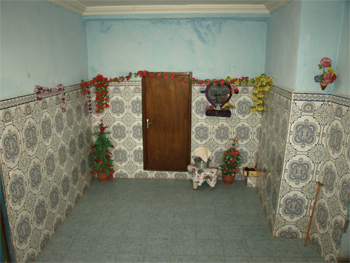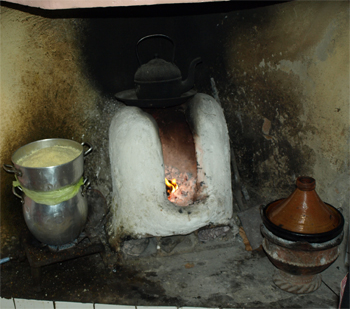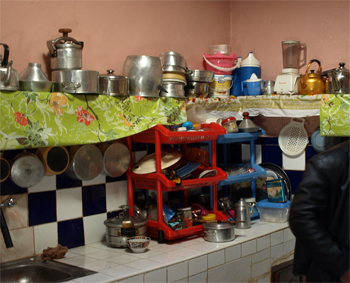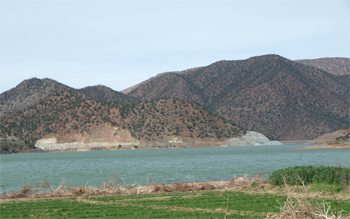Sat., 2/19/11 - Marrakech - Amizmiz, Asni and Ouirgane
This morning we met Jaafar for our journey into the High Atlas Mountains. Near Amizmiz we stopped to look down on the first Moroccan dam and reservoir built by the French in 1923. (We get the very clear idea the French occupation was not all bad for this country.) The water and electricity from this dam supply Marrakech and the villages along the way.
Amizmiz - reservoir |
Amizmiz - town and reservoir
|
The town of Mouly Brahim is an old Berber town that carries on some of the traditions/superstitions that the Berbers practiced before Islam was introduced in Morocco. Women still flock to the town to enter a pool of water if they want to have a baby.
|
Mouly Brahim
|
Preparing for the camel festival
|
We are about a week away from another "festival." A camel will be slaughtered - it's head cut off - and if you touch the ground where the blood spilled, it will bring you good fortune.
|
We also got an explanation of the numbered rectangles we have seen painted on town walls in most of the larger villages (Arabic is written right to left). Each of the two-dozen political parties is assigned one rectangle for political propaganda before elections. This takes the place of the millions of campaign posters we are assaulted with in the US.
|
For electioneering
|
Road hazard
|
Several times on our drive today we had to wait for flocks of sheep to get off the road. It is very rural and agricultural land.
|
At the Berber town of Asni we walked through another weekly market. It was crowded but a lot of sales were taking place. Teddy and Barbara tried some fried sardines - they are more adventurous than we are - and we all had bananas for our mid-morning snack. The interesting item at this market was the dark rocks of salt. They come from local salt mines and caves and are used for animal salt licks. The white crystals and salt cones come from the ocean or sea.
Headed for market |
Grinding grain
|
Busy market |
Tasting sardines
|
More rock salt
|
And more salt |
At Ouirgane we got onto mules (Barbara chose to hike) and were led into the hillside and up to the old Jewish town of Anruz. Some Jews still live here so there is a synagogue. Jaafar did not go with us and the three mule men with us spoke no English except for the warning, "duck," at low obstructions and the "guide" spoke only some words. We did not get off the mules to "discover" the Jewish mellah and were not given any explanation about the houses, the Jewish tombs (we aren't sure we even saw them), the Berber cemetery, or the synagogue. It was rather disappointing to have ridden up there for nothing. We just turned around and rode back. The mules did have horse/mule-hair saddles with stirrups of a sort. They were in poor repair so we did get the idea of how people travel in this hilly terrain. It was a warm day, the ride was peaceful, and we only saw snowy peaks in the distance. We could occasionally see the high peak (13,370 feet) of Mt. Toubkal, Morocco’s highest.
Ouirgane |
Our host's house
|
At least we had stirrups (unlike on the camels) |
Mud brick houses
|
Barbara was the smart one
|
River and peaceful countryside |
On the trail
|
Irrigation channel |
A stork, of course
|
We ate another meal of tagine and couscous, bread and oranges or apples at a local Berber house. The man organizes these mule rides for Jaafar and OAT and feeds lunch to the tourists.
|
Entryway |
Cookstove
|
The kitchen
|
Sitting with our mint tea, Jaafar told us that our trip to Casablanca was in jeopardy because the country's unions were planning a demonstration in Casablanca tomorrow. Our sightseeing could be problematical because of blocked roads and possibly stone throwing, etc. We won't know what tomorrow's plan will be until later. |
On the ride back to Marrakech we looked at another dam and reservoir. On the opposite hillside was another painted rock sign that read, "God, Country, and King" with a five pointed star in the middle. This is the Moroccan slogan of the people.
|
Reservoir - sign is white squiggle in center just above the shoreline
|
